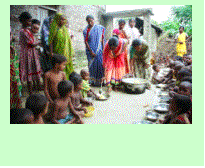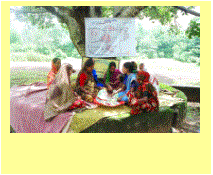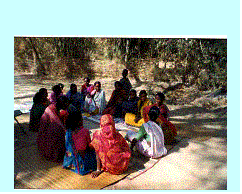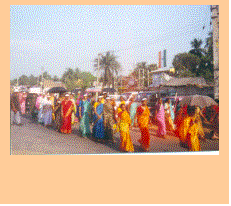![]() Impacting and Improving Women's Lives
Impacting and Improving Women's Lives
CARE
(India) is mandated by its mission statement to facilitate lasting change in the
well being and social position of vulnerable groups especially women and girls.
In keeping with this mandate, CARE continues to retain its program focus on
women and girls, guided by the understanding that working with this group will
benefit the larger community. Accordingly all CARE projects have an intrinsic
gender focus.
In CARE West Bengal 3 projects
are currently underway and are implemented in collaboration with the Department
of Women and Child Development, Department of Health and Family Welfare and
Department of Panchayat and Rural Development. These projects are the

 Integrated Nutrition and Health Project (INHP)
operational in 91 blocks across nine districts of the state. The project aims to
reduce Infant Mortality Rate and Malnutrition among children less than 2 years
of age. In this endeavour the project attempts to confront forms of
discrimination and vulnerability faced by women and girls that result in lower
health and nutrition status. In order to offset this, INHP intensely works to
develop and foster women’s groups and women community volunteers. Frontline
workers of the government departments as well as CARE’s partner NGOs
intensively train these women. The trained women are today agents for changing
behaviour at the household level and are actively engaged in improving the
health and nutrition status of the other women within their communities. They
are involved in a spectrum of activities at the village level in order to ensure
better service delivery to the communities as well as monitoring positive
behaviour change among the community members.
Integrated Nutrition and Health Project (INHP)
operational in 91 blocks across nine districts of the state. The project aims to
reduce Infant Mortality Rate and Malnutrition among children less than 2 years
of age. In this endeavour the project attempts to confront forms of
discrimination and vulnerability faced by women and girls that result in lower
health and nutrition status. In order to offset this, INHP intensely works to
develop and foster women’s groups and women community volunteers. Frontline
workers of the government departments as well as CARE’s partner NGOs
intensively train these women. The trained women are today agents for changing
behaviour at the household level and are actively engaged in improving the
health and nutrition status of the other women within their communities. They
are involved in a spectrum of activities at the village level in order to ensure
better service delivery to the communities as well as monitoring positive
behaviour change among the community members.
 Credit and Savings for Household Enterprises (CASHE)
is a poverty focussed project designed to address the fundamental problem of low
incomes for poor women and their limited control over that income. The project
is operational in seven districts, besides which it is also operating in other
districts especially in North Bengal through strategic alliances for capacity
building and advocacy. CASHE works to enhance the economic empowerment of poor
rural women in the state by promoting an institutional set up that provides them
with sustainable and quality Micro Finance services and capacity for
negotiation. The project emphasizes on gender equity in access to micro credit
interventions, looking more at issues such as property rights, which is an
important element of improving the economic status of the poor women. CASHE’s
performance in championing SHG’s potential in financial and social
intermediation role towards women’s empowerment has not only made its quality
performance visible and recognized, but also made others to think about SHG’s
quality and the use of its potential for women’s empowerment. Today CASHE has
a total of 11090 SHGs across its operational area.
Credit and Savings for Household Enterprises (CASHE)
is a poverty focussed project designed to address the fundamental problem of low
incomes for poor women and their limited control over that income. The project
is operational in seven districts, besides which it is also operating in other
districts especially in North Bengal through strategic alliances for capacity
building and advocacy. CASHE works to enhance the economic empowerment of poor
rural women in the state by promoting an institutional set up that provides them
with sustainable and quality Micro Finance services and capacity for
negotiation. The project emphasizes on gender equity in access to micro credit
interventions, looking more at issues such as property rights, which is an
important element of improving the economic status of the poor women. CASHE’s
performance in championing SHG’s potential in financial and social
intermediation role towards women’s empowerment has not only made its quality
performance visible and recognized, but also made others to think about SHG’s
quality and the use of its potential for women’s empowerment. Today CASHE has
a total of 11090 SHGs across its operational area.
 Community
Based DOTS
project works in close partnership with RNTCP and is striving to break the cycle
of disease transmission and reducing the burden of tuberculosis. Recognizing the
increased vulnerability of women suffering from TB, the project has a focussed
target of working with various kinds of women’s groups as Community Based
Operating Partners (CBOP). This approach has worked to increase the case
detection rate among women through community sensitization as well as act as a
support system and ensure treatment compliance.
Community
Based DOTS
project works in close partnership with RNTCP and is striving to break the cycle
of disease transmission and reducing the burden of tuberculosis. Recognizing the
increased vulnerability of women suffering from TB, the project has a focussed
target of working with various kinds of women’s groups as Community Based
Operating Partners (CBOP). This approach has worked to increase the case
detection rate among women through community sensitization as well as act as a
support system and ensure treatment compliance.